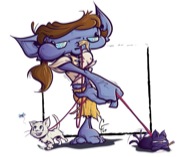Ecology of the Pathfinder Product, Part 2: The Awkward Development YearsTuesday, September 29, 2009
Cave Raptors are sated; It's time to blog!
When last we left Dwarves of Golarion, it was a mere egg of an outline, being fussed over by attentive parents and waiting to hatch. But now it is time for that blessed moment when an idea emerges into the world as written words! It is time for… the development phase!
Development is the process of growing a book from an idea and a few rough notes into written text, rearing the infant outline into a rebellious and hateful teenager who will keep you up at nights, drinking your secret stash of scotch and praying to god it turns out alright. Much like the rearing of the noble octopus, a game product requires two separate parties: the designer and the developer. Designers are the writers and artists (more on those wily and attractive artists next week), while the developers are the core who tie everything together. Where developers are comparable to an overprotective parent, designers are more akin to teachers: chosen carefully by the developer to impart information and direction to their snot-nosed offspring.
Of course, this is not an insult. Both octopi and game developers are widely known for their post-nasal drip.
Choosing a writer is a careful task. Like parents, developers want someone who will make their job easier. These choices are made by means of an arcane formula that takes into account past products, punctuality, and relative position of the stars. Managing Editor Wes Schneider admits that Paizo relies on a small, incestuous lot of authors to rear our products. Putting new designers through their paces requires time and branding irons, both of which Paizo has in painfully limited quantities*.
For roleplaying products, the ideal designer can fill three vital roles for the juvenile product: author, game mechanic, and artisan. Telling a good story and having a firm grasp of the mechanics are important, but just as vital and oft overlooked is the role of player-friendly artifacts in a young game's life. Like a sweater vest, legible maps and gripping player handouts are those little touches that decide if a product rides along on the bus or resides at the cool table at lunch.
The developers' job is just as challenging and vital to give their books the best chance at happiness. They need to organize everything those precious bundles have absorbed from their designers and make sure they play nice with the other products. A developer needs to tweak the mechanics to balance with the system at large, rewrite some fluff to keep the narrative canon, and embarrass the product in front of its friends. Even the best writing needs at least a week or two in development, says Schneider, because "folks aren't here every day, and they don't know exactly what we need."
Dwarves of Golarion and similar anthology products are like troubled foster kids: they get bounced between several authors and other corrupting influences. A firm and loving eyeball is needed to guide them through this troubled time. The twitterpated Sean Reynolds, developer in charge of this problem child, has had his hands full. Every line written by its savage gang of authors needs to be reviewed for balance and continuity, and he must occasionally search its room for illicit substances and pop culture references.
Without proper development, a game product suffers. Its already-overworked Paizo parents stretch themselves too thin trying to write thousands of words a day while maintaining their backbreaking day jobs in the grammar mines. Neglected and uneducated, the books would fall back into dull narrative habits and eventually turn to crime to make ends meet. Crime rates skyrocket, property values plummet, and we are all left unprepared for the forthcoming invasion of the reptimen from the Earth's core!
So, for a happy and contributing addition to the RPG landscape, make sure you follow the example of the methodical octopus. Keep a close group of talent to help raise your products, but don't give away your own parental responsibilities!
Tune in next week, when we examine the art of art, and stretch the octopus metaphor to it's breaking point!
Crystal Frasier
Production Assistant*Wes also mentions that if you're a newcomer who'd like to write for Paizo and has a high pain threshold, you should still write and submit. Both the Pathfinder Society Open Call and RPG Superstar are Paizo's favorite tools for reviewing new blood in an organized setting. Publishing your own material online through a blog or website is a good icebreaker as well (check out Paizo's Community Use Policy for more details). Being on productive and nonviolent terms with other publishers also helps, as the RPG industry is made up of a mere 73 people, all of whom know each other personally and frequently gather for the imbibing of caustic organic solvents.
We have updated our Privacy Policy.
Paizo.com uses cookies. You can block paizo.com from using cookies within your browser settings, but doing so will hinder site functionality.
More information can be found in our Privacy Policy.
